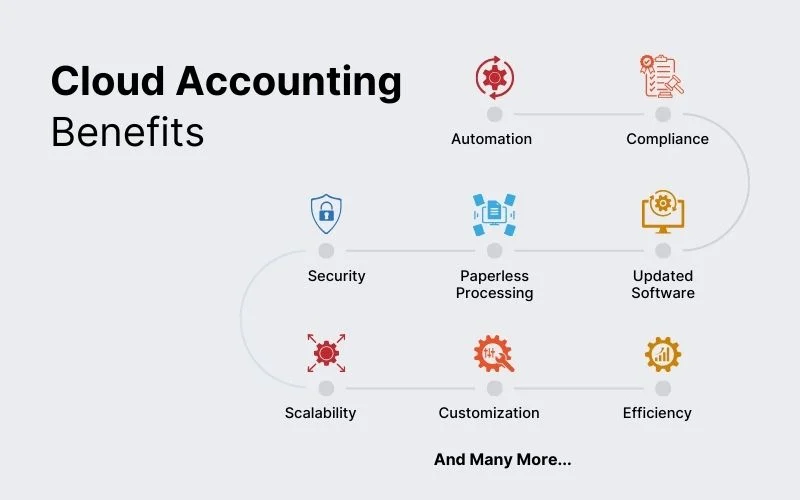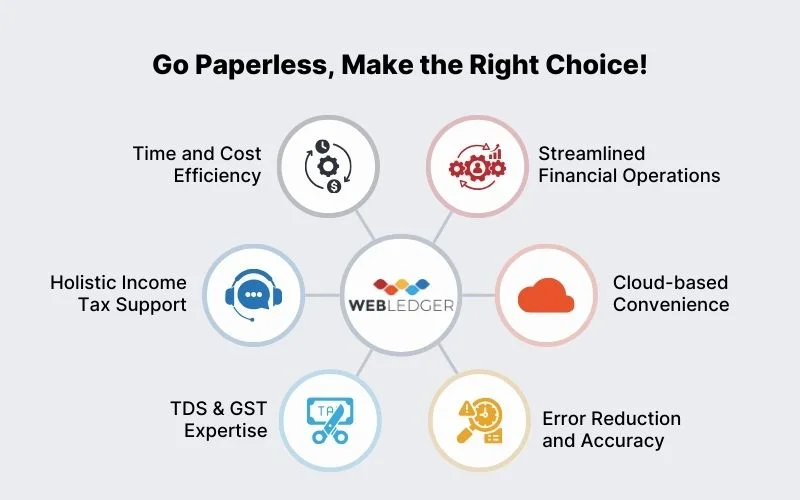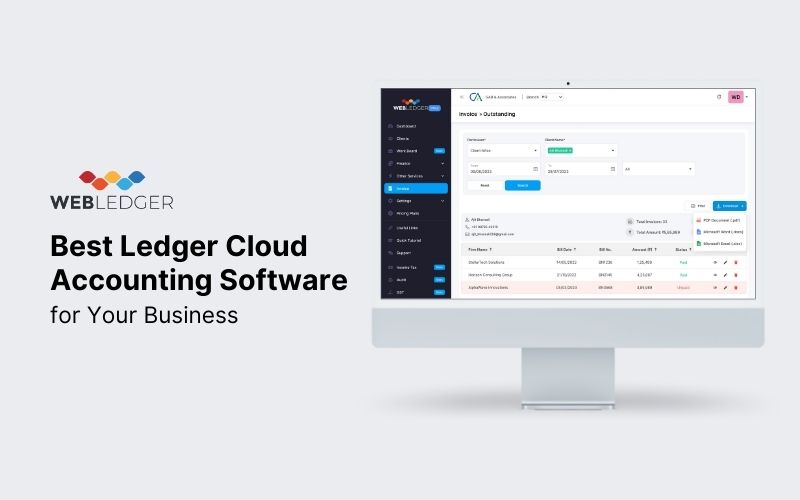Staying ahead in business operations requires adopting innovative solutions that streamline processes, enhance efficiency, and provide real-time insights. Cloud accountants have emerged as a transformative force, revolutionizing the traditional areas of financial management. This blog explores the many reasons why cloud accounting is not just good but essential for businesses seeking a competitive edge in today’s growing and diverse environment.
What is cloud accounting automation?
Cloud accounting automation is no less than a revolutionary approach which helps in financial management leveraging cloud-based technologies. It is very crucial in today’s tech savvy generation, the use of cloud accounting automation is a way to enhance efficiency and accuracy in accounting processes. Unlike traditional accounting practices, which often involve manual data entry, reconciliation, and reporting, this automation process is efficient, and error free. Since, there is no involvement of humans, there are less chances of being prone to errors in calculation. Cloud accounting automation addresses all these challenges with the designed advanced features and accumulating various tasks in less time compared to traditional ways.
Another fundamental aspect of cloud accounting automation is the use of cloud-based platforms. It is completely different from traditional ways, as unlike traditional accounting software installed on local servers, cloud-based accounting software is hosted on remote servers and accessed through the Internet. This feature allows users to gather data from anywhere, facilitating real-time collaboration and constant updates.
Automation of repetitive tasks is a core feature of cloud accounting, which allows user to be free from regular tasks of data entry, invoice processing, and bank reconciliation. With the integration of cloud accounting systems with other business applications, such as CRM and payroll software, one can have better efficiency, building a cohesive financial environment with better work.
Benefits of Cloud Accounting

- Automation: Cloud accounting platforms automate various repetitive tasks such as data entry, invoice processing, and reconciliation. This reduces the need for manual intervention, minimizing errors, and saving time for finance professionals to focus on more strategic and analytical aspects of financial management.
- Compliance: Cloud accounting solutions often come with built-in compliance features, helping businesses adhere to regulatory requirements and standards. The software can automatically update tax rates, generate compliant financial reports, and assist in meeting statutory obligations, reducing the risk of non-compliance penalties.
- Updated software: Cloud accounting software is regularly updated by providers to include new features, improvements, and security patches. Users automatically benefit from these updates without the need for manual installations, ensuring that the accounting system remains current and effective.
- Paperless processing: Cloud accounting promotes a paperless environment by digitizing documents and transactions. Invoices, receipts, and financial statements can be stored electronically, reducing the need for physical paperwork. This not only saves physical storage space but also contributes to a more environmentally friendly and efficient workflow.
- Security: Cloud accounting providers implement robust security measures, including data encryption, access controls, and regular security audits. Cloud platforms often provide better security compared to on-premises solutions, safeguarding financial data from unauthorized access and potential threats.
- Scalability: Cloud accounting solutions are scalable, allowing businesses to easily adjust their usage based on changing needs. Whether a company is experiencing growth or a decrease in transaction volumes, cloud accounting systems can adapt, providing a cost-effective solution that aligns with the business’s scale.
- Customisation: Many cloud accounting platforms offer customization options, allowing businesses to tailor the accounting software to their specific needs. This adaptability ensures that the accounting system aligns with unique business processes and requirements.
- Efficiency: With automation, real-time collaboration, and streamlined processes, cloud accounting significantly improves overall efficiency in financial management. Tasks are completed faster, and decision-makers have access to up-to-date information, enabling more informed and timely decisions.
- Remote Accessibility: Cloud accounting enables users to access financial data from anywhere with an internet connection. This remote accessibility is particularly valuable for businesses with distributed teams, allowing employees, accountants, and stakeholders to collaborate and work seamlessly from different locations.
- Team-Collaboration: Cloud accounting fosters collaboration among team members. Multiple users can work on the same financial data simultaneously, enhancing communication and coordination among different departments and stakeholders.
- Regular Backups: Cloud accounting platforms typically include automatic backup features. This ensures that financial data is regularly backed up and can be quickly restored in the event of data loss, hardware failure, or other unforeseen issues.
- Business Continuity: Cloud accounting contributes to business continuity by providing reliable access to financial data, even in the face of disruptions such as natural disasters or hardware failures. Data stored in the cloud is resilient, ensuring that critical financial information remains accessible.
- Cost-Efficient Solution: Cloud accounting is often more cost effective than traditional on-premises solutions. Businesses can avoid upfront hardware costs, and the pay-as-you-go pricing model of many cloud services means companies only pay for the resources they use, making it a scalable and cost-efficient option.
How to choose a cloud-based accounting platform?
Choosing the right cloud-based accounting platform is a crucial decision for businesses looking to streamline financial processes, improve efficiency, and enhance overall financial management. The market offers a variety of options, each with its own features and capabilities. To make an informed decision, consider the following key factors:
- Business Needs and Goals: Start by assessing your business’s specific needs and long-term goals. Different industries and sizes of businesses have unique accounting requirements. Identify the features that are essential for your operations and the goals you aim to achieve through adopting a cloud-based accounting platform.
- Scalability: Ensure that the chosen platform is scalable to accommodate your business’s growth. A scalable solution allows you to adjust the usage and features based on changing needs. Consider not only your current requirements but also how the platform can support your business as it expands.
- Ease of Use: The usability of the platform is critical, especially if users with varying levels of accounting expertise will be interacting with the business accounting software. A user-friendly interface and intuitive navigation can contribute to a smoother transition and reduce the learning curve for your team.
- Integration Capabilities: Check the platform’s ability to integrate with other essential business applications such as CRM, payroll systems, and banking software. Integration streamlines data flow between different systems, reducing manual data entry and ensuring consistency across the organization.
- Automation Features: Look for automation features that can simplify routine tasks like invoicing, expense tracking, and reconciliation. Automation not only saves time but also reduces the likelihood of errors, contributing to more accurate financial reporting.
- Compliance and Security: Ensure that the platform complies with relevant industry regulations and standards. Security is paramount when dealing with financial data, so choose a platform that employs robust security measures such as data encryption, secure authentication, and regular security updates.
- Cost Structure: Understand the platform’s pricing model and ensure it aligns with your budget. Cloud accounting platforms typically offer subscription-based pricing, and it’s essential to consider factors like the number of users, features included, and any additional costs for add-ons or increased usage.
- Customization Options: Consider the level of customization the platform offers. Businesses have unique processes, and a customizable accounting platform allows you to adapt the CA practice management software to match your specific workflows and reporting requirements.
- Mobile Accessibility: With the increasing trend of remote work, mobile accessibility is crucial. Ensure that the platform provides a mobile app or a responsive web interface that allows users to access financial data and perform essential tasks on the go.
- Customer Support and Training: Evaluate the level of customer support and training provided by the platform. A responsive support team and comprehensive training resources can be invaluable during the implementation phase and ongoing usage of the online accounting software.
- Data Backup and Recovery: Check the platform’s data backup and recovery capabilities. Regular and automated backups are essential to ensure the security and availability of your financial data, especially in the event of unexpected data loss or system failures.
- User Reviews and Recommendations: Research user reviews and seek recommendations from businesses in similar industries or sizes. Understanding the experiences of other users can provide valuable insights into the platform’s performance, reliability, and overall suitability for your business.
Why Webledger is the right choice to go paperless
WebLedger emerges as the ideal choice for businesses aiming to go paperless due to its comprehensive features, innovative cloud-based architecture, and commitment to simplifying financial management and compliance. As a cloud-based accounting platform, WebLedger offers multi-device accessibility, allowing users to manage accounts anytime, anywhere. The multi-user interface fosters teamwork, ensuring collaborative efforts in financial tasks.

WebLedger’s cloud-based accounting software not only enhances financial management but also provides cutting-edge insights for making prudent business decisions. The platform’s automation features streamline processes, while the integration of modules like Cloud Accounting, Multi-Branch Management, and Striking Dashboards further caters to diverse business needs. Its commitment to compliance is evident in features like Client Management, Income Tax Filing, and Audit, making it a one-stop solution for various regulatory requirements.
With WebLedger, businesses can enjoy the benefits of a user-friendly interface, seamless integration with other applications, and efficient inventory management. The platform’s focus on automation extends to GST compliance, TDS calculation, and simplified Income Tax filing, ensuring accuracy and timeliness in financial reporting.
Cloud Accounting Benefits
Cloud accounting offers a range of compelling benefits that have revolutionized financial management for businesses. The transition from traditional on-premises solutions to cloud-based platforms has become increasingly popular due to the following advantages.
Cloud accounting software brings a significant level of automation to financial processes. Mundane tasks like data entry, invoicing, and reconciliation can be automated, reducing the likelihood of errors and freeing up valuable time for finance professionals. This automation contributes to increased efficiency and allows teams to focus on more strategic aspects of financial management.
The real-time accessibility of financial data is a game-changer. With cloud accounting, businesses can access their financial information from anywhere with an internet connection. This facilitates seamless collaboration among team members, whether they are in the same office or scattered across different locations. Real-time access empowers businesses to make informed decisions promptly and respond quickly to changing market dynamics.
Cost efficiency is another notable advantage of cloud accounting. Unlike traditional accounting solutions that often require significant upfront investments in hardware and infrastructure, cloud accounting operates on a pay-as-you-go model. This allows businesses to scale their usage based on their needs and pay only for the resources they consume, making it a cost-effective solution, particularly for small and medium-sized enterprises.
Security and compliance are paramount in financial management, and cloud accounting addresses these concerns effectively. Cloud accounting providers implement robust security measures, including data encryption and access controls, ensuring the confidentiality and integrity of financial data. Additionally, many cloud accounting platforms come equipped with built-in compliance features, helping businesses meet regulatory requirements and standards.
The scalability of cloud accounting is a significant advantage. As businesses grow or experience fluctuations in transaction volumes, cloud accounting systems can easily adapt to changing needs. This scalability ensures that businesses have the flexibility to adjust their usage and features, aligning with their evolving requirements.
FAQs
What is cloud accounting and how does it differ from traditional accounting?
Cloud accounting is a modern approach to financial management that utilizes cloud-based technology. Unlike traditional accounting, which often involves on-premises bookkeeping software and manual processes, cloud accounting operates on remote servers accessible through the Internet. This allows for real-time collaboration, automation, and enhanced security.
How does cloud accounting contribute to automation in financial processes?
Cloud accounting platforms automate repetitive tasks such as data entry, invoice processing, and reconciliation. This not only saves time but also reduces the likelihood of errors, allowing finance professionals to focus on more strategic aspects of financial management.
What security measures are in place to protect financial data in cloud accounting?
Cloud accounting providers implement robust security measures, including data encryption, access controls, and regular security audits. These measures ensure the confidentiality and integrity of financial data, often surpassing the security features of traditional on-premises solutions.
How does cloud accounting support business scalability?
Cloud accounting solutions are scalable, allowing businesses to adjust their usage based on changing needs. Whether a company is experiencing growth or a decrease in transaction volumes, cloud accounting systems can adapt, providing a cost-effective solution that aligns with the business’s scale.
What are the cost advantages of adopting cloud accounting for business?
Cloud accounting is often more cost effective than traditional on-premises solutions. It eliminates upfront hardware costs, and many cloud services operate on a pay-as-you-go pricing model. This means businesses only pay for the resources they use, making it a scalable and cost-efficient option.






